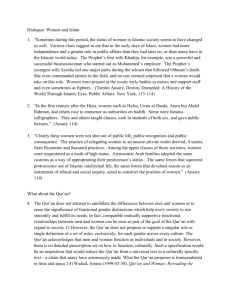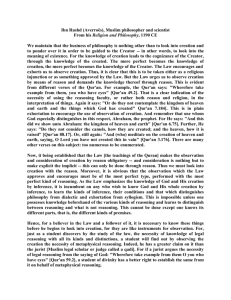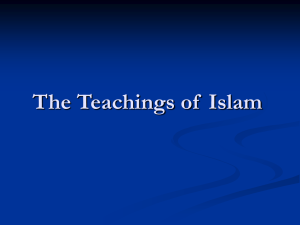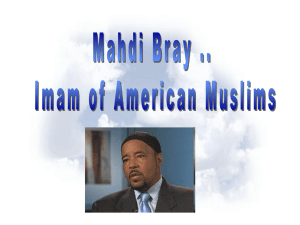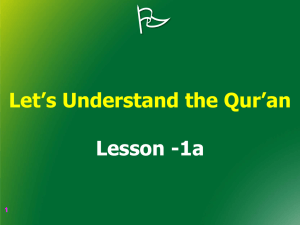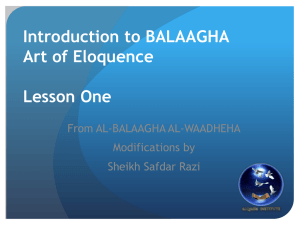Kecia Ali file
advertisement
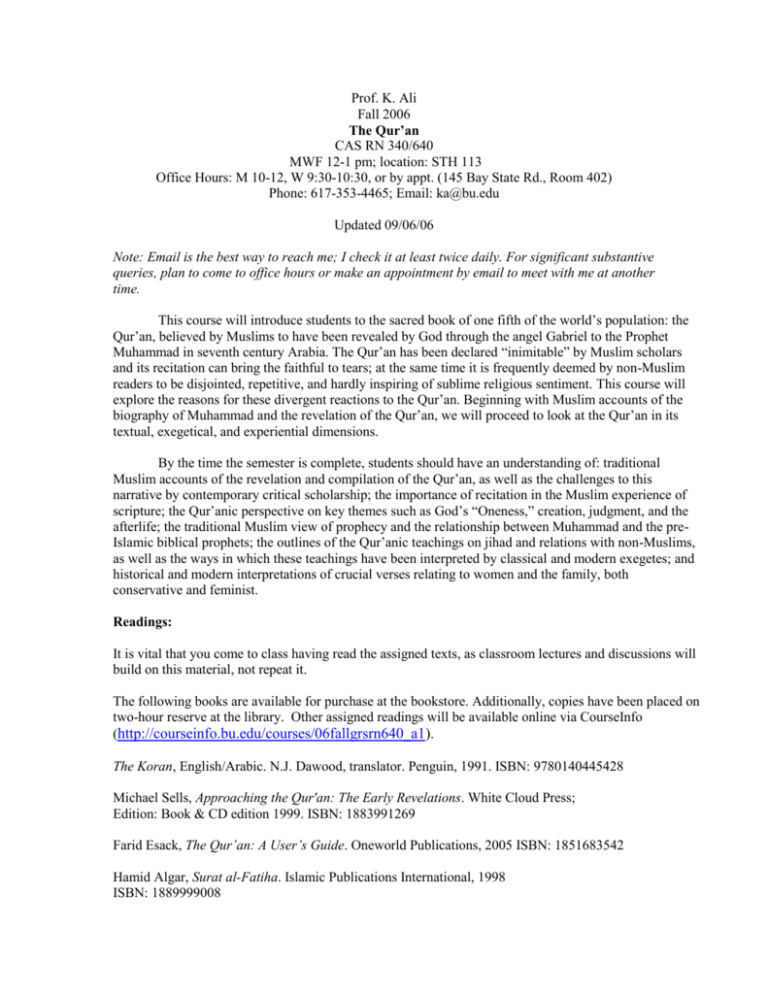
Prof. K. Ali Fall 2006 The Qur’an CAS RN 340/640 MWF 12-1 pm; location: STH 113 Office Hours: M 10-12, W 9:30-10:30, or by appt. (145 Bay State Rd., Room 402) Phone: 617-353-4465; Email: ka@bu.edu Updated 09/06/06 Note: Email is the best way to reach me; I check it at least twice daily. For significant substantive queries, plan to come to office hours or make an appointment by email to meet with me at another time. This course will introduce students to the sacred book of one fifth of the world’s population: the Qur’an, believed by Muslims to have been revealed by God through the angel Gabriel to the Prophet Muhammad in seventh century Arabia. The Qur’an has been declared “inimitable” by Muslim scholars and its recitation can bring the faithful to tears; at the same time it is frequently deemed by non-Muslim readers to be disjointed, repetitive, and hardly inspiring of sublime religious sentiment. This course will explore the reasons for these divergent reactions to the Qur’an. Beginning with Muslim accounts of the biography of Muhammad and the revelation of the Qur’an, we will proceed to look at the Qur’an in its textual, exegetical, and experiential dimensions. By the time the semester is complete, students should have an understanding of: traditional Muslim accounts of the revelation and compilation of the Qur’an, as well as the challenges to this narrative by contemporary critical scholarship; the importance of recitation in the Muslim experience of scripture; the Qur’anic perspective on key themes such as God’s “Oneness,” creation, judgment, and the afterlife; the traditional Muslim view of prophecy and the relationship between Muhammad and the preIslamic biblical prophets; the outlines of the Qur’anic teachings on jihad and relations with non-Muslims, as well as the ways in which these teachings have been interpreted by classical and modern exegetes; and historical and modern interpretations of crucial verses relating to women and the family, both conservative and feminist. Readings: It is vital that you come to class having read the assigned texts, as classroom lectures and discussions will build on this material, not repeat it. The following books are available for purchase at the bookstore. Additionally, copies have been placed on two-hour reserve at the library. Other assigned readings will be available online via CourseInfo (http://courseinfo.bu.edu/courses/06fallgrsrn640_a1). The Koran, English/Arabic. N.J. Dawood, translator. Penguin, 1991. ISBN: 9780140445428 Michael Sells, Approaching the Qur'an: The Early Revelations. White Cloud Press; Edition: Book & CD edition 1999. ISBN: 1883991269 Farid Esack, The Qur’an: A User’s Guide. Oneworld Publications, 2005 ISBN: 1851683542 Hamid Algar, Surat al-Fatiha. Islamic Publications International, 1998 ISBN: 1889999008 Fazlur Rahman, Major Themes of the Qur’an. Biblioteca, 1989, second edition ISBN: 0882970461 Asma Barlas, “Believing Women” in Islam: Unreading Patriarchal Interpretations of the Qur’an. University of Texas Press, 2002. ISBN: 0292709048 Amina Wadud, Qur’an and Woman. Oxford University Press, 1999. ISBN: 0195128362 (Recommended) Note: Bring your Qur'an to each class session. Though knowledge of Arabic is in no way a prerequisite for this course, those students who have the ability may consult the parallel Arabic text in the Dawood translation. For supplementary reading outside of class, http://www.usc.edu/dept/MSA/quran/ is an excellent online resource, containing three different English translations of the Qur'an. It is searchable by keyword, and can provide an alternate version of difficult passages. You will also find listening assignments for some weeks. Some are found on the CD included with Sells, Approaching the Qur'an, while others are accessible online as MP3 files and can be found through the links in this syllabus. Assignments and grading: There are four components to your grade: attendance/participation; a midterm; two short papers; and a final exam. Attendance at all class sessions is necessary, because lectures will cover materials not in the class readings. Participation in discussions and in-class exercises is also an important element in this course. Together, attendance and participation will account for 10% of your grade. Please note that even if you miss a class session for a valid reason you are expected to obtain notes from a classmate, as you will still be responsible for any material covered or announcements given. Midterm: An in-class mid-term examination will account for 20% of your grade. Short papers: This course will have two 5 page papers (7-8 pages for graduate students), worth 20% of your grade each. The first will compare the biblical and Qur’anic treatments of the Joseph story. The second will cover the textual history of the Qur’an. More specific guidelines for these papers will be distributed and posted online as noted below. Students are encouraged to come to office hours to discuss thesis statements and outlines for papers. Final exam: Worth 30% of your grade, it will be held according to the University schedule. Policy on Late Work and Incompletes: Late work will be penalized by one complete letter grade for each day overdue including weekends and holidays. Please note that electronic submission of papers is not allowed. Extensions will be granted only in exceptional circumstances, and in no case after the original deadline for completion has passed. Students who anticipate difficulty in meeting deadlines should contact me as far in advance of the due date as possible. A course grade of incomplete will only be granted for compelling reasons. Make-up examinations will be scheduled in accordance with university policy. 2 Academic integrity, plagiarism, and independent work: Every student is expected to be familiar with and comply with the BU policy on academic integrity, which can be found at: http://www.bu.edu/cas/undergraduate/conductcode.html. I will refer any suspected case of academic misconduct to the Dean’s Office. Any assignment judged, after a hearing by the Academic Conduct panel, to be plagiarized will receive a grade of “0.” We will discuss plagiarism and independent work in class. Helpful resources about proper use of sources can be found many places online. Dartmouth College’s page on source usage (http://www.dartmouth.edu/~sources/contents.html), especially “What is plagiarism?” (http://www.dartmouth.edu/~sources/about/what.html), is a good place to begin. For guidance as to how best to use sources during your writing, see the Harvard University guide to “Writing with Sources” (http://www.fas.harvard.edu/%7Eexpos/sources/) and the Purdue University Online Writing Lab (OWL) guide to “Quoting, Paraphrasing, and Summarizing” (http://owl.english.purdue.edu/handouts/research/r_quotprsum.html). Disabilities: In accordance with University policy, a student who requires accommodation for a documented disability of any type should see me immediately to discuss modifications to course requirements. Class sessions: Wednesday 9/6 - Introduction Friday 9/8 Recite! The origins of prophecy Read: Qur’an, 96:1-5; Esack, pp. 1-55. Monday 9/11 Rhythm and revelation Read: Esack, pp. 56-77; Sells, Approaching the Qur’an, 1-28, 145-50; Listen to: Sells CD, Tracks 5, 10, 13, 18, 26, 29. Wednesday 9/13 Meccan verses: Divine judgment; divine signs Read: Sells, Approaching, pp. 44-141 (includes translations). Listen to: Sells CD, Tracks 3, 4, 6-9, 11, 12, and 14-17. Friday 9/15 Divine unity Read: Qur'an, S. 53:1-18, S. 81-114; Fazlur Rahman, Major Themes of the Qur’an, 1-79 Monday 9/18 Human obligation Read: Esack, pp. 146-90. Wednesday 9/20 Key concepts: Iqra’ revisited Read: Q. S. 96; Listen to: S. 96 at http://www.shaplus.com/free-quran-software/quran-mp3software/QuranReciter/quran-mp3.htm Friday 9/22 Al-Fatiha (the opening chapter) and its interpretation Read: Qur'an, S. 1; Sells, Approaching, pp. 42-3, 156-7; Hamid Algar, Surat al-Fatiha: Foundation of the Qur’an, 1-43. Listen to: Sells CD, Tracks 2, 23, 33. 3 Monday 9/25 Tafsir: The exegetical enterprise Read: Esack, pp. 120-145; Qur'an, S. 12 (Guidelines for Paper 1 distributed) Wednesday 9/27: Commentary on Surat Yusuf Read: Maududi's introduction to S. 12, http://www.usc.edu/dept/MSA/quran/maududi/mau12.html; Mustansir Mir, "Irony in the Qur'an: A Study of the Story of Joseph" (from Issa J. Boullata, ed., Literary Structures of Religious Meaning in the Qur'an, Surrey: Curzon, 2000) pp. 173-87 (CourseInfo); and Mir, "The Qur'anic Story of Joseph: Plot, Themes, and Characters," http://www.islamicawareness.org/Quran/Q_Studies/Mirjoseph.html. Friday 9/29: Comparing Bible and Qur’an Read: Genesis 37, 39-47 (http://www.bibleontheweb.com/Bible.asp or another edition); : Barbara Stowasser, "The Chapter of Zulaykha," pp. 50-6 (CourseInfo). Additional graduate student readings: Sufia Uddin, "A Mystical Journey or a Misogynist Assault?" (CourseInfo), Fedwa Malti-Douglas, selections from Woman’s Body, Woman’s Word (CourseInfo) Monday 10/2 (NO CLASS – EID AL-FITR) Wednesday 10/4: Prophets in History Read: Rahman 80-131, Q. S. 10, 11, 13-18, 20-21 Friday 10/6: Mary, Mother of Jesus Read Q. S. 3, S. 19; Listen to Surah 19, "Maryam" at http://www.shaplus.com/free-quransoftware/quran-mp3-software/QuranReciter/quran-mp3-4.htm. Monday 10/9 (NO CLASS – HOLIDAY) Tuesday 10/10 MAKE-UP class: Revelation and prophecy considered (Paper 1 due at beginning of class) No new readings; we will tie up any loose ends from previous sessions. Wednesday 10/11: Madinan revelation: community life and family life Read: Q. S. 2; selections from al-Tabari's commentary (CourseInfo). Friday 10/13: Madinan revelation: community life and family life Read: Q. S. 4:1-105 Monday 10/16 Madinan revelation: community life and family life Read: Q. S. 9; S. 47-48; selections from Taha, The Second Message of Islam (CourseInfo). Wednesday 10/18 MIDTERM Friday 10/20: Categories of non-Muslims Read: Qur’an, S. 4:105-176, S. 5; Rahman, Major Themes, Appendix I and II, pp. 150-170. 4 Monday 10/23 Relations with non-Muslims Read: Helmut Gatje, The Qur’an and its Exegesis, pp. 133-45, 212-4 (CourseInfo); Jane Dammen McAuliffe, Qur'anic Christians: An Analysis of Classical and Modern Exegesis, 1-9, 129-79 (CourseInfo). Wednesday 10/25 Intermarriage No new readings. Friday 10/27: Interreligious conflict: Jihad Read: reread Q. 2:190-194. Read commentaries (Tafsir al-Jalalayn and Tanwir al-Miqbas fi Tafsir Ibn ‘Abbas) on these verses at www.altafsir.com; find another commentary online, read and bring your notes (along with the URL) to class. Monday 10/30: Competing views of Muslims in the world No new readings. Wednesday 11/1: Dress and modesty Read: First read Qur’an, S. 24:30-31; 33:53; and 33:59, then go back and read S. 24 and S. 33 in their entirety. Friday 11/3: Dress and modesty in commentaries Read: “Women’s Modesty in Qur’anic Commentaries: The Founding Discourse,” by Soraya HajjajiJarrah (pp. 181-213) (CourseInfo) Monday 11/6: Feminist approaches to the Qur'an 1 Read: Asma Barlas, “Amina Wadud’s Hermeneutics of the Qur’an,” pp. 97-123 (CourseInfo); Recommended, Amina Wadud, Qur’an and Woman, entire book Wednesday 11/8 Feminist approaches to the Qur'an 2 Read: Barlas, selections from Believing Women in Islam: Unreading Patriarchal Interpretations of the Text. Friday 11/10 NO CLASS Monday 11/13: Feminist approaches to the Qur'an 3 Read: Amina Wadud, selections from Inside the Gender Jihad (CourseInfo). (Guidelines for Paper 2 distributed) Wednesday 11/15: The compilation of the text and current critical scholarship Read: Read first three sections at http://www.uga.edu/islam/quran.html; Esack pp. 18-99 Friday 11/17: Competing perspectives on Qur’anic history Read: Ahmed von Dennfer, Ulum al-Qur’an, Chapter 2, pp. 31-66, The Koran, pp. 119-140 (CourseInfo); Lester, “What is the Koran?” pp. 107-25 (CourseInfo) Additional graduate student readings: Burton, “The Collection of the Qur’an,” pp. 59-117 (CourseInfo); Brockett, “The Value of the Hafs and Warsh Transmissions,” pp. 33-45 (CourseInfo) Monday 11/20: (NO CLASS – AAR Conference) Wednesday 11/22 (NO CLASS – HOLIDAY) 5 Friday 11/24 (NO CLASS – HOLIDAY) Monday 11/27: Historicity of the Qur’anic text No new readings. Wednesday 11/29: Qur’an as living text Read: William Graham, Beyond the Written Word: Oral Aspects of Scripture in the History of Religion, pp. 79-115 (CourseInfo). (Paper 2 due at beginning of class.) Friday 12/1: Qur’an education in the modern world Read: Denny, “Qur’an Recitation in Indonesia,” pp. 288-306 (CourseInfo). Monday 12/4: Revisiting recitation Listen to: S. 36, Ya-Sin, at http://www.shaplus.com/free-quran-software/quran-mp3software/QuranReciter/quran-mp3-3.htm. Wednesday 12/6: TBD Friday 12/8: TBD Monday 12/11 TBD Final (scheduled between 12/15 and 12/20) 6
